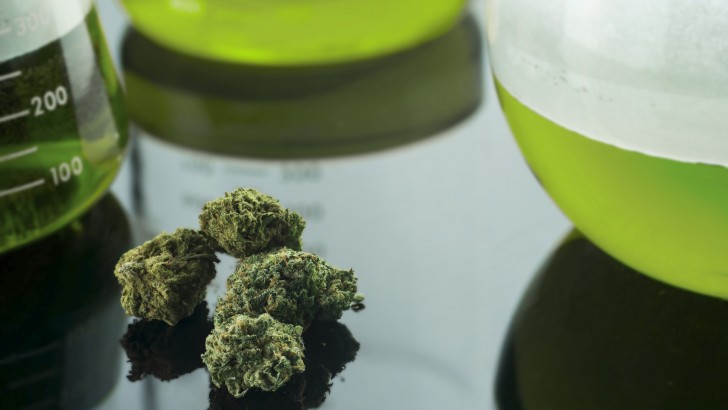How to Establish and Maintain Quality by Choosing the Right Cannabis Testing Lab

By: Matt Haskin
If you are in the pharmaceutical or recreation, commercial or consumer side of the $2.7 billion in sales cannabis industry, you know that quality controls at all levels of production, preparation and sales should become and remain the hallmark of your business.
That is why it is essential to establish consistent quality controls and ongoing monitoring procedures to establish and protect your business operations and reputation in order to succeed and grow.
As the nation’s first ISO 17025:2005 accredited cannabis testing facility, CannaSafe Analytics knows the importance of staying on the cutting edge of cannabis science.
The reason this is important is that new variables are being introduced rapidly into the processing and horticultural process. As a result, testing should not be viewed as a static process, but one which changes and adapts to new natural developments and industry advances as they occur.
Today, CannaSafe Analytics runs a myriad of tests that include testing for cannabinoid potency; terpene profiling; pesticide residue screening; microbial bioburden assaying; residual solvent analysis in cannabis concentrates; nutritional analysis and fact panel services for all infused products; strain genotyping and DNA mapping services. In addition, CannaSafe provides product formulation and labeling consulting, as well as consulting services to businesses, state, and local governments.
Raising the Quality Levels to International Standards
“There is no doubt that this industry is gaining momentum at the national level. And with that will come more scrutiny about establishing high standards. We are already seeing this in states that have established robust regulations such as Nevada, and more recently, California. State mandated testing will take the entire cannabis industry to the next level where public safety is a top priority.
“The public deserves to have faith and confidence in the safety of the products they consume, which means they need to have faith and confidence in the laboratory performing the QA testing on those products,” CannaSafe’s CEO Matt Haskin said. “Virtually every other industry that deals with the public, especially in regards to pharmaceutical and food products, requires that their labs attain accreditation. The cannabis industry should be no exception.
“In the past, any discussion of marijuana typically focused on THC, but cannabis contains over 400 active chemicals, many which are not psycho-active and are recognized as being beneficial to treat a variety of conditions, ranging from anxiety and inflammation to epilepsy and brain degenerative diseases.”
Haskin added that “Our labs have performed tens of thousands of tests on cannabis over the last five years, and the more we explore this plant, the more we advance our knowledge of just how cannabis works. Not only are we safeguarding the public, but we are advancing the science of cannabis.”
What Quality Assurance Criteria Must Be Met To Get Optimal Product
In order to establish a baseline level of quality control, as well as maintaining a high standard for all cannabis products going forward, professionals in the business should ask the following questions of any lab which tests their products, either for medical or recreational uses:
* What are the qualifications of the labs personnel? Lab Directors should be a PhD or have the equivalent experience.
* What type of instrumentation is used to perform all the required testing?
* How often are the instruments calibrated?
* How often are the balances, pipettes and other equipment required for measurement calibrated by an accredited calibration laboratory?
* Does the lab use internal or external reference standards?
* Are surrogate controls being used in the testing matrix?
* What QA/QC measures are in place quality assurance program is being followed?
* How often is the calibration curve for each analysis set?
* Who audits the methodologies and SOP’s for proper validation?
* Do they participate in annual proficiency testing (PT) with an accredited PT professional?
* What is the standard deviation and total uncertainty of the lab?
* Does the lab perform LoD (limit of detection) and LoQ (limit of quantitation) studies to determine their measurement capabilities?
* What is the lab’s scope of testing capabilities?
While these questions are specific, they also are just a sampling of what is required to be awarded an ISO 17025:2005 accreditation. CannaSafe Analytics, which is ISO accredited, is audited annually by an independent third party accreditation laboratory in order to maintain its accreditation. Under international agreements, results produced from an ISO accredited lab are accepted world-wide as accurate, reproducible and verifiable.
Under current laws, Massachusetts and California under AB266 require that all testing labs be accredited to meet ISO 17025:2005 standards.
CannaSafe was the first cannabis lab in the United States to gain ISO 17025 accreditation. To stay on the cutting edge of cannabis analytics and quality standards, CannaSafe continues to develop proprietary testing methods and operating protocols, all of which are subjected to validation as required by ISO standards.
Today, CannaSafe has the largest scope of accredited test methodologies than any other accredited cannabis lab in the United States. The lab is currently testing hemp CBD products internationally with clients in Spain, Lithuania, the Czech Republic and China.
 EN
EN

